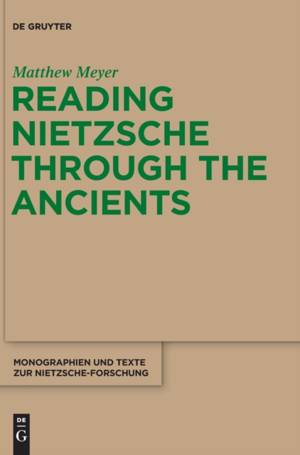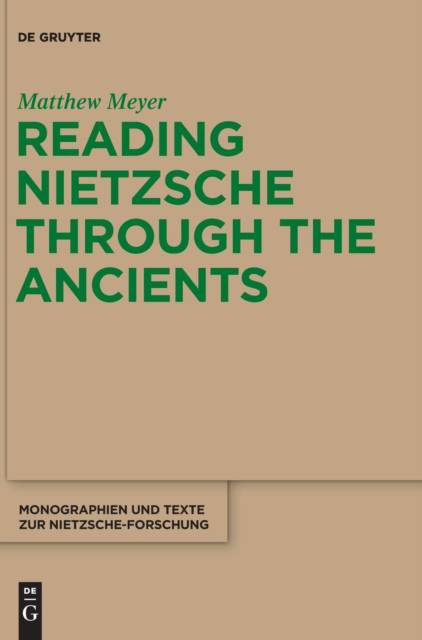
Bedankt voor het vertrouwen het afgelopen jaar! Om jou te bedanken bieden we GRATIS verzending (in België) aan op alles gedurende de hele maand januari.
- Afhalen na 1 uur in een winkel met voorraad
- In januari gratis thuislevering in België
- Ruim aanbod met 7 miljoen producten
Bedankt voor het vertrouwen het afgelopen jaar! Om jou te bedanken bieden we GRATIS verzending (in België) aan op alles gedurende de hele maand januari.
- Afhalen na 1 uur in een winkel met voorraad
- In januari gratis thuislevering in België
- Ruim aanbod met 7 miljoen producten
Zoeken
Reading Nietzsche Through the Ancients
An Analysis of Becoming, Perspectivism, and the Principle of Non-Contradiction
Matthew Meyer
€ 256,45
+ 512 punten
Omschrijving
Nietzsche's work was shaped by his engagement with ancient Greek philosophy. Matthew Meyer analyzes Nietzsche's concepts of becoming and perspectivism and his alleged rejection of the principle of non-contradiction, and he traces these views back to the Heraclitean-Protagorean position that Plato and Aristotle critically analyze in the Theaetetus and Metaphysica IV, respectively. At the center of this Heraclitean-Protagorean position is a relational ontology in which everything exists and is what it is only in relation to something else. Meyer argues that this relational ontology is not only theoretically foundational for Nietzsche's philosophical project, in that it is the common element in Nietzsche's views on becoming, perspectivism, and the principle of non-contradiction, but also textually foundational, in that Nietzsche implicitly commits himself to such an ontology in raising the question of opposites at the beginning of both Human, All Too Human and Beyond Good and Evil.
Specificaties
Betrokkenen
- Auteur(s):
- Uitgeverij:
Inhoud
- Aantal bladzijden:
- 317
- Taal:
- Engels
- Reeks:
- Reeksnummer:
- nr. 66
Eigenschappen
- Productcode (EAN):
- 9781934078419
- Verschijningsdatum:
- 13/05/2014
- Uitvoering:
- Hardcover
- Formaat:
- Genaaid
- Afmetingen:
- 170 mm x 244 mm
- Gewicht:
- 657 g

Alleen bij Standaard Boekhandel
+ 512 punten op je klantenkaart van Standaard Boekhandel
Beoordelingen
We publiceren alleen reviews die voldoen aan de voorwaarden voor reviews. Bekijk onze voorwaarden voor reviews.









